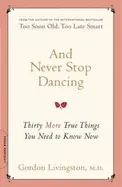
And Never Stop Dancing - by Gordon Livingston
ISBN: 0738212490Date read: 2016-08-03
How strongly I recommend it: 1/10
(See my list of 430+ books, for more.)
Go to the Amazon page for details and reviews.
His other book, “Too Soon Old, Too Late Smart” was brilliant. Read that one. This is the weak sequel. Skip this one.
my notes
Many of the rules we follow were constructed to protect the interests and privileges of someone other than us.
With the notable exception of those we pay to entertain us, most people tend to underestimate their strengths.
Passion between a romantic couple is finite. If it lasts a thousand days, count yourself among the lucky. There is no loneliness like marriage.
After listening to someone go on and on about what a terrible person his or her spouse turned out to be, I often say something like, “I guess he changed as a person in a way you would never have predicted.” The response is usually, “Yes, that’s exactly what happened.” Then I say, “OK, that’s called a mistake. One of the rules of life is that, in general, we have to pay for our mistakes. What you’re feeling at the moment is your payment.”
How can we know whether we have the ability to love another adult as much as we love ourselves? The best indications are how we behave in their presence. How does this other person make us feel about ourselves? Are we at our best when we are with them?
A good marriage is easy provided that both people have been astute in the selection process. If we choose a partner with ample reserves of kindness and a willingness to place us at the center of his or her life, and if we have sufficiently cultivated those virtues in ourselves, we can refute the “hard work” school of marriage and partake of the endless pleasures of renewable love.
Don't vent your frustrations. Don't even complain. Anger begets anger. Kindness begets kindness.
Most people grew up in homes in which they were socialized by their parents through the use of “discipline” and criticism. This sort of upbringing suggests that, left to their own devices, children are agents of disorder and defiance. These are the assumptions that promote criticism and anger as the normal way to relate to those closest to us.
The challenge for all of us is to mobilize our own considerable capacity for change, to refine our judgments about what we want and how to get it, and not to imagine that the instructions or conclusions of someone else will rescue us.
Life is not a rehearsal. Our time, while uncertain, is finite. People at every age are dying every day, most with a lot of unfinished business.
“You seem hesitant about doing things differently; do you consider yourself fragile?”
Children growing up in families in which one or both parents exhibit a high level of apprehension are often vulnerable themselves to unreasonable fears.
Just beneath the surface of an apparent phobia lies an exaggerated sense of the world as a dangerous place.
Each year the police in my town offer to X-ray treats handed out on Halloween, looking (vainly so far) for that elusive razor blade in the apple. What messages are we giving our kids about how to live comfortably in the world?
The best stepparenting strategy is to leave the discipline to the child’s parent. The good stepparent is able to give the child something unique: a friendly, nonjudgmental adult perspective on the world.
Life in general and good relationships with other human beings in particular don’t have to be difficult. In fact, if they are, maybe you need to reevaluate your approach. The entire self-help industry depends on a “Life is hard” worldview.
The first thing I wonder when meeting a new patient is, “What is this person’s readiness for change?”
The paradox of sleep: You can’t have it until it’s not important to you.
Deemphasize the importance of sleep. The importance of a solid eight hours of sleep a night is a myth. Most people can function well on a lot less, and our bodies can be trusted to make up sleep deficits before we collapse from fatigue.
Pessimists turn out to be right in the long runj
Every snowflake in an avalanche pleads not guilty.
Most people die with their music still inside them.